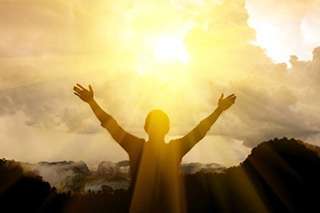It is said that over 4000 years ago when the Hindu Faith, Sanatana Dharma, had still not transformed to become Hinduism, people accepted Moksha as the Ultimate Goal of life. Not only was it considered an escape from the cycle of death and rebirth, it was also Liberation from misery and sorrow when alive, with the realization of the Truth that we are the Divine Atman or the Soul. Life is an endless cycle of birth, death, and rebirth into a physical universe. Hindu scriptures describe Moksha as the spiritual Liberation from this continuous cycle of death and rebirth and attainment of an eternal and blissful state that transcends all suffering of the body, mind, and ego.
Moksha, also known as Mukti, literally means freedom. It implies freedom from all suffering of body, mind, and ego. How does one escape all this suffering? The Realization that one is not the gross body that suffers physical pain and one is not the subtle body that is tormented by fear, worry, and anxiety, results in Mukti or freedom from suffering. This ultimately leads to Moksha.
How does one achieve Moksha? How can one be free from both, suffering in this lifetime, as well as an escape from rebirth again and again that causes us to suffer? Moksha prescribes four doors that one should pass through before one is ready to start their journey of freedom or Mukti. These four doors are Vivek or Discrimination, Vairagya or Dispassion, Shat Sampat or Discipline, and Mumukshutva or Desire for the Divine.
The first door is Discrimination. For one to attain Moksha, one has to live a life of Discrimination, referred to by the sages as Vivek. What does this mean? The mind is constantly producing thoughts, up to 50,000 thoughts a day. These thoughts make us sink in the Bhoga of Samsara, the sensual pleasures of this world. To attain Moksha one should live with Discrimination. In normal human beings, the intellect is weak and does not discriminate every thought. Thus, it becomes difficult to be in Yoga or Union with the Divine, which is the only way to Moksha because otherwise, one is constantly sinking in the ocean of worldly thoughts.
The second door to Moksha is Dispassion or Detachment which is called by the sages as Vairagya. We are all connected to our family, friends, and society. How can we detach from the world? A true seeker of Moksha doesn’t try to run away from the world, but being in the world, he is internally detached. He is not attached to his possessions and the people that he is connected with. On the outside, he appears to be a normal human being, but deep within he lives with detachment, disconnected from the world and connected with the Divine. To be detached, one has to live with Dispassion. The moment we are passionate, and we desire and crave, we become a slave to our own passions.
The third door is Discipline of body and mind. The sages prescribed six wealths which were in reality, disciplines. To simplify the prescription and understand it, one needs the perfect discipline of body and mind through Sadhana or Spiritual Discipline. We human beings are said to be like a chariot with 5 horses. The 5 horses are the 5 senses that we are blessed with. The reigns of the horses is our mind. We, the Divine Soul, are the charioteer. To discipline our life, we must take charge of the 5 senses by controlling the mind.
The fourth door is Desire for the Divine and Liberation. The sages called this door Mumukshutva. We human beings are not able to be liberated because we desire and crave for worldly possessions. We fall in love with people, knowing very well that these relationships are temporary. Our ignorance makes us love an illusion and we fail to love the Divine. We fail to crave for Liberation. When one builds their life on these 4 pillars, one has created a firm foundation to be liberated. These 4, together help us realize the Truth about Life, about who we are and why we are here.
Yoga is a very important step on the path towards attaining Moksha. Real Yoga is not just physical exercise or breathing techniques, but a union with the Divine. Like a SIM card is constantly connected to its network, we must live a life of constant Yoga or union. It may be through devotion or through meditation, spiritual study, and acts of service to others. We must remain connected with the Ultimate Power whom we call God. Yoga must be made a way of life. The cycle of Yoga gives us an opportunity to live with Dhyana Yoga, Yoga of meditation, Karma Yoga, the Yoga of action, Gyana Yoga, Yoga of wisdom and education, or Bhakti Yoga, Yoga of devotion. Whatever be the Yoga, as long as we live in union or in Yoga, we can achieve Moksha or Liberation.
Moksha is a concept 5000 years old,
To renounce and discriminate one must be bold.
Then there will be Liberation from misery on earth,
And we will escape the cycle of death and rebirth.
